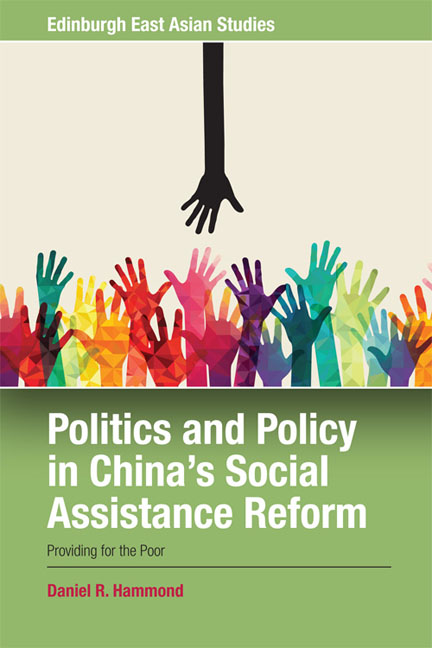Book contents
- Frontmatter
- Contents
- Acknowledgements
- Note on Chinese and Translations
- Glossary of Terms and Abbreviations
- Introduction
- 1 Historical Background to Dibao and the Question of Poverty in China
- 2 Urban Dibao: Emergence and Transition to National Policy, 1992–1999
- 3 Urban Dibao: The Resolution of Unwanted and Unintended Outcomes, 1999–2003
- 4 Rural Dibao: The Countryside and Fragmentation
- 5 Institutionalisation? Achieving Policy in a Fragmented State
- Conclusion
- Appendix: Interview List
- Bibliography
- Index
3 - Urban Dibao: The Resolution of Unwanted and Unintended Outcomes, 1999–2003
Published online by Cambridge University Press: 18 December 2019
- Frontmatter
- Contents
- Acknowledgements
- Note on Chinese and Translations
- Glossary of Terms and Abbreviations
- Introduction
- 1 Historical Background to Dibao and the Question of Poverty in China
- 2 Urban Dibao: Emergence and Transition to National Policy, 1992–1999
- 3 Urban Dibao: The Resolution of Unwanted and Unintended Outcomes, 1999–2003
- 4 Rural Dibao: The Countryside and Fragmentation
- 5 Institutionalisation? Achieving Policy in a Fragmented State
- Conclusion
- Appendix: Interview List
- Bibliography
- Index
Summary
Introduction
The previous chapter noted how the emergence, spread and implementation of the urban MLG could be explained through the FA framework. It was shown that the space provided by the structure of the Chinese state facilitated innovation in social assistance policy in Shanghai when there were policy actors willing to exploit it. It was also shown that the structure of the state could serve to shape and constrain the choices available to particular actors, whereas those who wielded additional authority were in a position to force through decisions. In this chapter the development of the urban MLG in the period 1999 to 2003 will be discussed. This period is significant because, as noted in Chapter 1, there was significant expansion in the scope and spending on the urban MLG but the reasons for this go undiscussed. What is notable about this period is that it demonstrated that even during a period when the policy-making environment in China was changing the power of elite leaders was undiminished and could still be used to force through significant changes in policy. What is also notable is that the expansion of the urban MLG shows the MCA taking advantage of the situation in order to resolve a number of problems it was facing and also to expand its own capabilities.
The chapter will first discuss some of the challenges that the urban MLG was facing after national implementation was achieved – primarily a problem of variation although it manifested in different ways. It will be argued that the reasons for this variation are partly due to the design of the policy but also due to the process through which it came to be implemented nationally. The chapter then goes on to show how the intervention of a powerful policy actor, Premier Zhu Rongji, brought about a situation where various issues facing the MLG were temporarily resolved. This intervention demonstrates the key elements of the FA framework in action, namely the interaction of values, state structure and the relative authority of different actors in the system. The chapter will end with a discussion of how the MCA exploited both Zhu's intervention and the fragmented nature of the system in order to pursue its own agenda.
- Type
- Chapter
- Information
- Politics and Policy in China's Social Assistance ReformProviding for the Poor?, pp. 67 - 88Publisher: Edinburgh University PressPrint publication year: 2018



